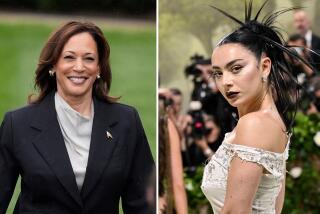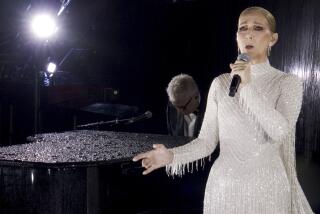No Sax Please--We’re British
- Share via
LONDON — An embattled conservative administration is challenged by an opponent from a traditionally liberal party. The charismatic challenger, aiming to enhance the party’s appeal to younger voters, plays up his own rock ‘n’ roll tastes--even tabbing a former hit song with an upbeat, forward-looking message as his theme.
Any of this sound familiar to U.S. voters?
It should. It’s the approach that helped sweep Bill Clinton into the White House in 1992, following 12 years of Republican occupancy.
But it’s also the approach taken in the current campaign by the U.K.’s Labor Party, which was defeated in a 1992 attempt to end a long run of the Conservative Party, known popularly as the Tories.
In fact, it’s no secret that the Labor team carefully studied the Clinton blueprints in designing this campaign. And if the pollsters are accurate, it appears that Tony Blair, who at 43 is even younger than Clinton, will be swept into office as Britain’s first rock ‘n’ roll prime minister in Thursday’s election.
While Clinton campaigned with saxophone in hand a few times, we have yet to hear any archival recordings of Ugly Rumours, the short-lived college band that featured vocals by Blair, who as a member of Parliament representing Sedgefield in England’s northeast has been the leader of the opposition since 1994.
But he’s taken pains to establish rock connections, presenting David Bowie his lifetime achievement honors at the Brit Awards last year and proudly accepting a multi-platinum disc commemorating Oasis’ success, given to him at a Labor Youth rally last year.
That rally appearance was engineered by Alan McGee, head of Oasis’ U.K. label, Creation Records, and perhaps the key Blair supporter in the music business. At that same event, Blair praised McGee, who founded Creation with a $1,500 bank loan, as a prime example of the kind of enterprising spirit the Labor Party would encourage.
It’s that angle that has been the Labor Party line regarding its rock relations, with the youth appeal being downplayed.
“I find it a bit pathetic if politicians try and use music as a sort of medium for connecting with young people,” says Tony Banks, one of Labor’s most outspoken members of Parliament, who names Alanis Morissette and PJ Harvey as his current musical favorites. “But the music industry as an economic area of activity is something completely different. . . . I think it’s right that Tony [Blair] shows a close interest in that.”
Blair has openly courted the support of British music industry executives more directly and intensely than any previous prime minister candidate. He recently invited the top brass of the major U.K. record companies to a meeting at the House of Commons, where he promised that a Labor government would do all in its power to tighten copyright laws and generally boost an industry that he credited with a significant contribution to British exports.
But the politicians are also not averse to using the rock support to boost a hipness quotient. After the youth rally it was revealed that Blair and his advisors had met regularly with McGee and Creation press officer Andy Saunders for help in choosing the most appropriate music to use in the campaign. Rather than a baby boomer anthem a la Fleetwood Mac’s “Don’t Stop,” the Clinton theme, Labor chose a more recent but similarly upbeat and undemanding anthem: “Things Can Only Get Better,” a 1994 U.K. chart-topper by the dance-pop group D:Ream.
What do the rockers expect to gain for their Labor support?
On two key symbolic issues, at least, Blair has not taken what would seem to be the rock positions. He’s stated that he would not rescind the current administration’s legislation outlawing unlicensed outdoor rave concerts, and he’s made it very clear that Labor would not even consider proposals to liberalize Britain’s drug laws.
McGee, who has donated more than $100,000 out of his own pocket to the campaign, more readily identifies Conservative policies he hopes to see end than Labor policies he wants implemented, though the restoration of the National Health Service is a particular passion of his.
But he summed up his position simply as “I hate the [expletive] Tories. That’s me. I just want the Tories out.”
More to Read
The biggest entertainment stories
Get our big stories about Hollywood, film, television, music, arts, culture and more right in your inbox as soon as they publish.
You may occasionally receive promotional content from the Los Angeles Times.










